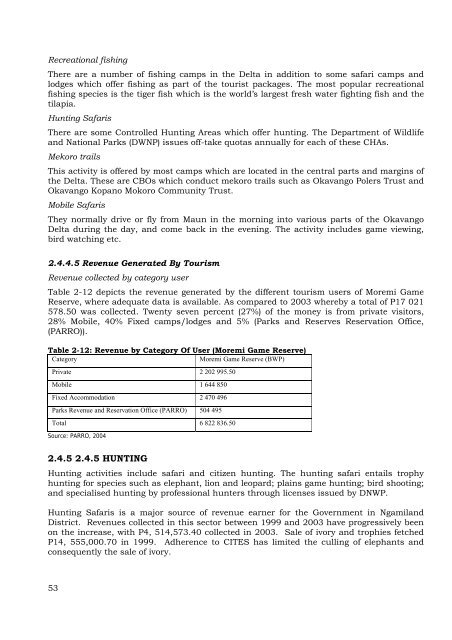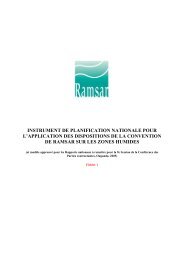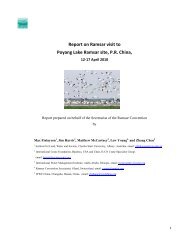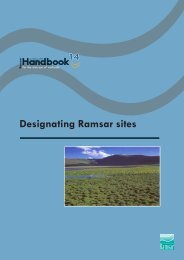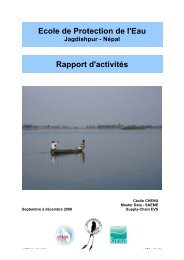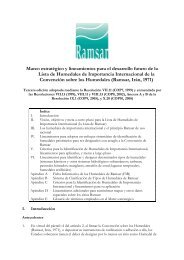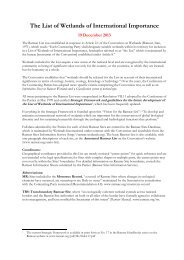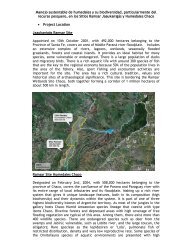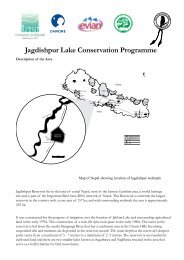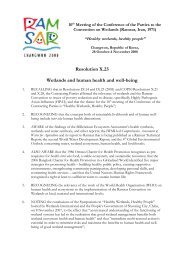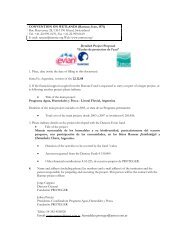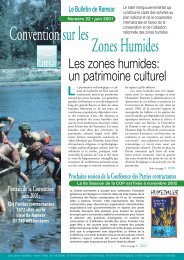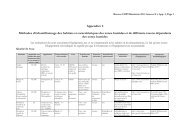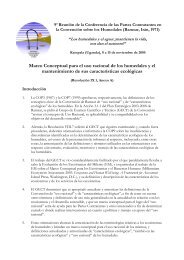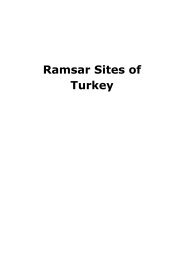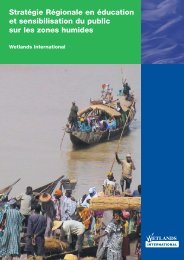Okavango Delta Management Plan - Ramsar Convention on Wetlands
Okavango Delta Management Plan - Ramsar Convention on Wetlands
Okavango Delta Management Plan - Ramsar Convention on Wetlands
Create successful ePaper yourself
Turn your PDF publications into a flip-book with our unique Google optimized e-Paper software.
Recreati<strong>on</strong>al fishing<br />
There are a number of fishing camps in the <str<strong>on</strong>g>Delta</str<strong>on</strong>g> in additi<strong>on</strong> to some safari camps and<br />
lodges which offer fishing as part of the tourist packages. The most popular recreati<strong>on</strong>al<br />
fishing species is the tiger fish which is the world’s largest fresh water fighting fish and the<br />
tilapia.<br />
Hunting Safaris<br />
There are some C<strong>on</strong>trolled Hunting Areas which offer hunting. The Department of Wildlife<br />
and Nati<strong>on</strong>al Parks (DWNP) issues off-take quotas annually for each of these CHAs.<br />
Mekoro trails<br />
This activity is offered by most camps which are located in the central parts and margins of<br />
the <str<strong>on</strong>g>Delta</str<strong>on</strong>g>. These are CBOs which c<strong>on</strong>duct mekoro trails such as <str<strong>on</strong>g>Okavango</str<strong>on</strong>g> Polers Trust and<br />
<str<strong>on</strong>g>Okavango</str<strong>on</strong>g> Kopano Mokoro Community Trust.<br />
Mobile Safaris<br />
They normally drive or fly from Maun in the morning into various parts of the <str<strong>on</strong>g>Okavango</str<strong>on</strong>g><br />
<str<strong>on</strong>g>Delta</str<strong>on</strong>g> during the day, and come back in the evening. The activity includes game viewing,<br />
bird watching etc.<br />
2.4.4.5 Revenue Generated By Tourism<br />
Revenue collected by category user<br />
Table 2-12 depicts the revenue generated by the different tourism users of Moremi Game<br />
Reserve, where adequate data is available. As compared to 2003 whereby a total of P17 021<br />
578.50 was collected. Twenty seven percent (27%) of the m<strong>on</strong>ey is from private visitors,<br />
28% Mobile, 40% Fixed camps/lodges and 5% (Parks and Reserves Reservati<strong>on</strong> Office,<br />
(PARRO)).<br />
Table 2-12: Revenue by Category Of User (Moremi Game Reserve)<br />
Category Moremi Game Reserve (BWP)<br />
Private 2 202 995.50<br />
Mobile 1 644 850<br />
Fixed Accommodati<strong>on</strong> 2 470 496<br />
Parks Revenue and Reservati<strong>on</strong> Office (PARRO) 504 495<br />
Total 6 822 836.50<br />
Source: PARRO, 2004<br />
2.4.5 2.4.5 HUNTING<br />
Hunting activities include safari and citizen hunting. The hunting safari entails trophy<br />
hunting for species such as elephant, li<strong>on</strong> and leopard; plains game hunting; bird shooting;<br />
and specialised hunting by professi<strong>on</strong>al hunters through licenses issued by DNWP.<br />
Hunting Safaris is a major source of revenue earner for the Government in Ngamiland<br />
District. Revenues collected in this sector between 1999 and 2003 have progressively been<br />
<strong>on</strong> the increase, with P4, 514,573.40 collected in 2003. Sale of ivory and trophies fetched<br />
P14, 555,000.70 in 1999. Adherence to CITES has limited the culling of elephants and<br />
c<strong>on</strong>sequently the sale of ivory.<br />
53


